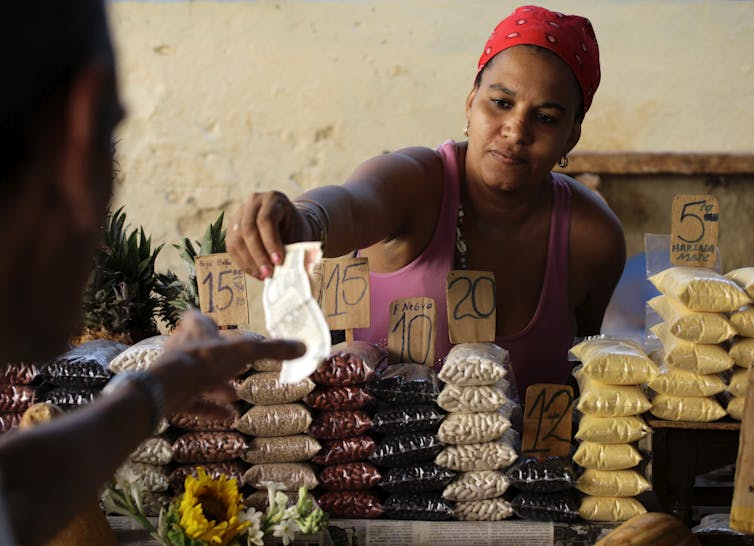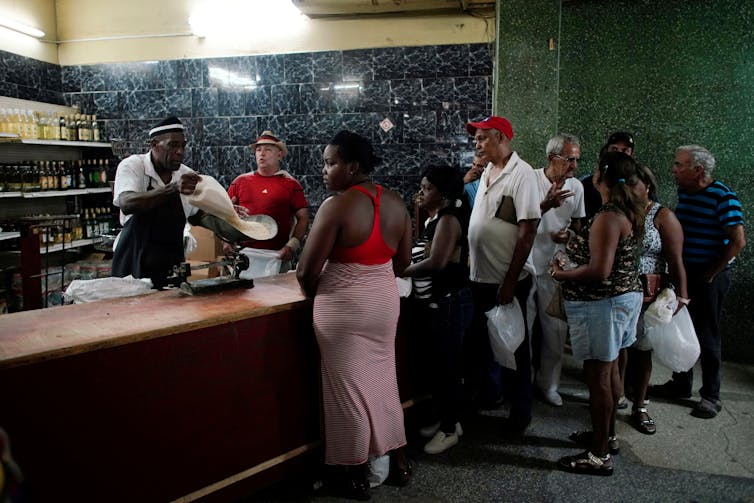Fidel's Cuba is long gone
- Written by Joseph J. Gonzalez, Associate Professor, Global Studies, Appalachian State University
Cuba is no longer the Americas’ lonely outpost of communism.
This Caribbean island has become a nation of entrepreneurship, democratic aspiration[1], even pro-Americanism. About 13% of Cuban workers[2] are in the private sector, operating their own businesses. They are called “cuentapropistas,” meaning “people who work for themselves” – not for the government.
Much of this economic activity is due to former president Raul Castro, who expanded[3] the rights of Cuban business owners, albeit in fits and starts[4].
Raul’s brother Fidel Castro, who led Cuba’s 1959 communist revolution and ran the country until 2008, would not recognize his country today.
Since Cuba’s emerging private sector depends heavily on tourism – including, until a recent Trump administration crackdown, from the United States – the cuentapropistas have transformed the nature of U.S.-Cuban relations, my area of research as a historian[5].
Anti-Americanism is still official Cuba policy. But now, for the first time in Cuba’s modern history, some people openly disagree.
Economic transformation
When I first traveled to Cuba as a graduate student in 1996, Cubans were suffering through what Fidel called “The Special Period in Time of Peace[6]” – an era of economic distress after the fall of the Soviet Union.
A Cuban friend recalls it as “the time when we ate cats and dogs.”
For decades, the Soviets aided the Cuban economy by purchasing[7] Cuban sugar at above-market prices and supplying Cuba with free oil. Cuba re-exported excess oil for profit.
The dissolution of the Soviet Union in 1991 deprived Cuba’s economy of about US$5 billion dollars[8] a year.
Food and consumer goods disappeared from stores in under a month. The Cuban economy shrunk by more than a third[9] between 1991 and 1995. Cars disappeared from roads, replaced by horses, bikes and overcrowded buses. Blackouts were common. Eggs became a luxury, given as gifts. Cubans lost anywhere from 12 to 20 pounds[10] during the Special Period.
By the mid-1990s, even Fidel Castro knew that Cuba needed to update[11] its economic model. So the country embraced tourism, investing over $3.5 billion[12] in hotels and resorts, aimed at Europeans.
Tourism fueled Cuba’s recovery[13], but the economy really took off after Fidel relinquished power[14] in 2008. His brother Raul Castro trimmed bloated state payrolls and encouraged Cubans[15] to start their own businesses.
By 2014, the government had transferred millions of acres[16] of idle land into private hands, reigniting Cuba’s agricultural sector.
Cuba’s government is still officially communist and it still controls the economy[17]. But it has a new president who’s not a Castro[18], internet access is expanding, and it’s home to a community of taxi drivers, hair stylists, restaurant owners and tattoo artists who meet demand with supply and pocket the profits.
 Cuban entrepreneurs rely heavily on tourism.
Reuters/Desmond Boylan[19]
Cuban entrepreneurs rely heavily on tourism.
Reuters/Desmond Boylan[19]
More money, less red tape
Cuba’s new entrepreneurs seem to have little faith in socialism.
The owner of a successful eatery in Havana, Alejandro, mostly sees the Cuban government as a barrier to success. To protect their identities, I do not use the names of Cubans when writing about my research.
“Even if I have money, there is no guarantee that I will be able to get supplies from abroad,” Alejandro told me over dinner recently. “No one in the government helps me.”
Contradictory legislation makes it difficult to open bank accounts in Cuba[20], sign contracts and import goods from abroad. Alejandro relies on “mules” to get kitchen equipment, rare foodstuffs and other goods into Cuba.
During the Special Period, most Cubans I met blamed the U.S. trade embargo for their troubles. And not without justification[21]: The embargo prevents U.S. companies and their foreign subsidiaries from investing in Cuba.
The embargo is still in place. But now I meet Cubans who are openly anti-communist, not anti-American. They have relatives and friends in the United States. They sell smuggled American goods. And they want politicians to get out of the way of the economy so that American dollars return to Cuba.
Only about 20,000 Americans[22] visited Cuba in 2007. In 2017, 1.5 million Americans[23] traveled to the island, including Cuban Americans. They spent millions at businesses run by cuentapropistas.
“Politics means nothing to me,” a young woman named Yemayá told me. “It’s just a way for some people to make themselves rich while I work hard.”
Research validates her view. A study from Baruch College found that Cuba’s bureaucrats have responded[24] to Raul’s initiatives by creating more burdensome regulations. They know that if all the red tape goes away, so will their jobs.
Cuban capitalists
The United States remains a major obstacle to Cuba’s economic development.
Rejecting Obama’s policy of more open relations with Cuba, the Trump administration has waged economic war[25] on the regime, putting severe restrictions on travel[26] to and investment in[27] Cuba.
 People wait to buy rice at a government store in Havana, May 10, 2019.
Reuters/Alexandre Meneghini[28]
People wait to buy rice at a government store in Havana, May 10, 2019.
Reuters/Alexandre Meneghini[28]
Overall tourist activity in Cuba has declined 20% this year[29]. That primarily harms Cuban capitalists[30] – not the government.
“We who work are suffering,” Miguel, an English teacher turned tour guide, told me. “The military will not suffer. Neither will the police. They know how to feed themselves.”
But Cuban entrepreneurs blame Cuba’s leaders for their hardships, too.
“[Cuba] wants Trump and the U.S. to shut off the tourists,” a taxi driver named Pablo insisted. That way, “they can blame the Americans for their own economic failures.”
Change from within
Cubans have changed, says Luis, an expert on Afro-Cuban religions.
Cubans used to depend on the government for everything. Now, he says, “there are more like me who want to work for themselves.”
“I have a nice apartment and a good life,” Luis told me. “The government did not give me that.”
Cuba’s capitalists still value the social achievements of the Cuban Revolution, which gave their country world-class literacy rates[31] and life expectancies[32]. They want to keep those gains.
“The rest we will change,” said Tony, a restaurateur in Old Havana.
A transformation is underway in Cuba, and the United States can help or hurt it. But I doubt anything can stop the process.
[ Deep knowledge, daily. Sign up for The Conversation’s newsletter[33]. ]
References
- ^ democratic aspiration (www.nytimes.com)
- ^ 13% of Cuban workers (www.miamiherald.com)
- ^ who expanded (www.nytimes.com)
- ^ fits and starts (www.reuters.com)
- ^ research as a historian (networks.h-net.org)
- ^ The Special Period in Time of Peace (en.wikipedia.org)
- ^ purchasing (www.nytimes.com)
- ^ about US$5 billion dollars (www.upi.com)
- ^ more than a third (www.environmentandsociety.org)
- ^ 20 pounds (books.google.com)
- ^ Cuba needed to update (en.wikipedia.org)
- ^ investing over $3.5 billion (en.m.wikipedia.org)
- ^ Cuba’s recovery (books.google.com)
- ^ relinquished power (www.nytimes.com)
- ^ encouraged Cubans (www.miamiherald.com)
- ^ transferred millions of acres (www.granma.cu)
- ^ still controls the economy (theconversation.com)
- ^ new president who’s not a Castro (theconversation.com)
- ^ Reuters/Desmond Boylan (pictures.reuters.com)
- ^ difficult to open bank accounts in Cuba (thecubaneconomy.com)
- ^ justification (www.reuters.com)
- ^ 20,000 Americans (www.nbcnews.com)
- ^ 1.5 million Americans (www.nbcnews.com)
- ^ have responded (thecubaneconomy.com)
- ^ economic war (theconversation.com)
- ^ restrictions on travel (www.npr.org)
- ^ investment in (theconversation.com)
- ^ Reuters/Alexandre Meneghini (pictures.reuters.com)
- ^ 20% this year (www.nbcnews.com)
- ^ harms Cuban capitalists (www.apnews.com)
- ^ literacy rates (countryeconomy.com)
- ^ life expectancies (data.worldbank.org)
- ^ Sign up for The Conversation’s newsletter (theconversation.com)
Authors: Joseph J. Gonzalez, Associate Professor, Global Studies, Appalachian State University
Read more http://theconversation.com/fidels-cuba-is-long-gone-120271

